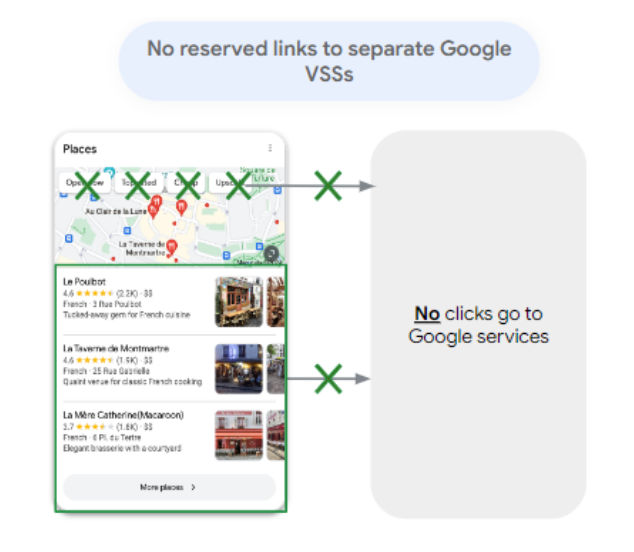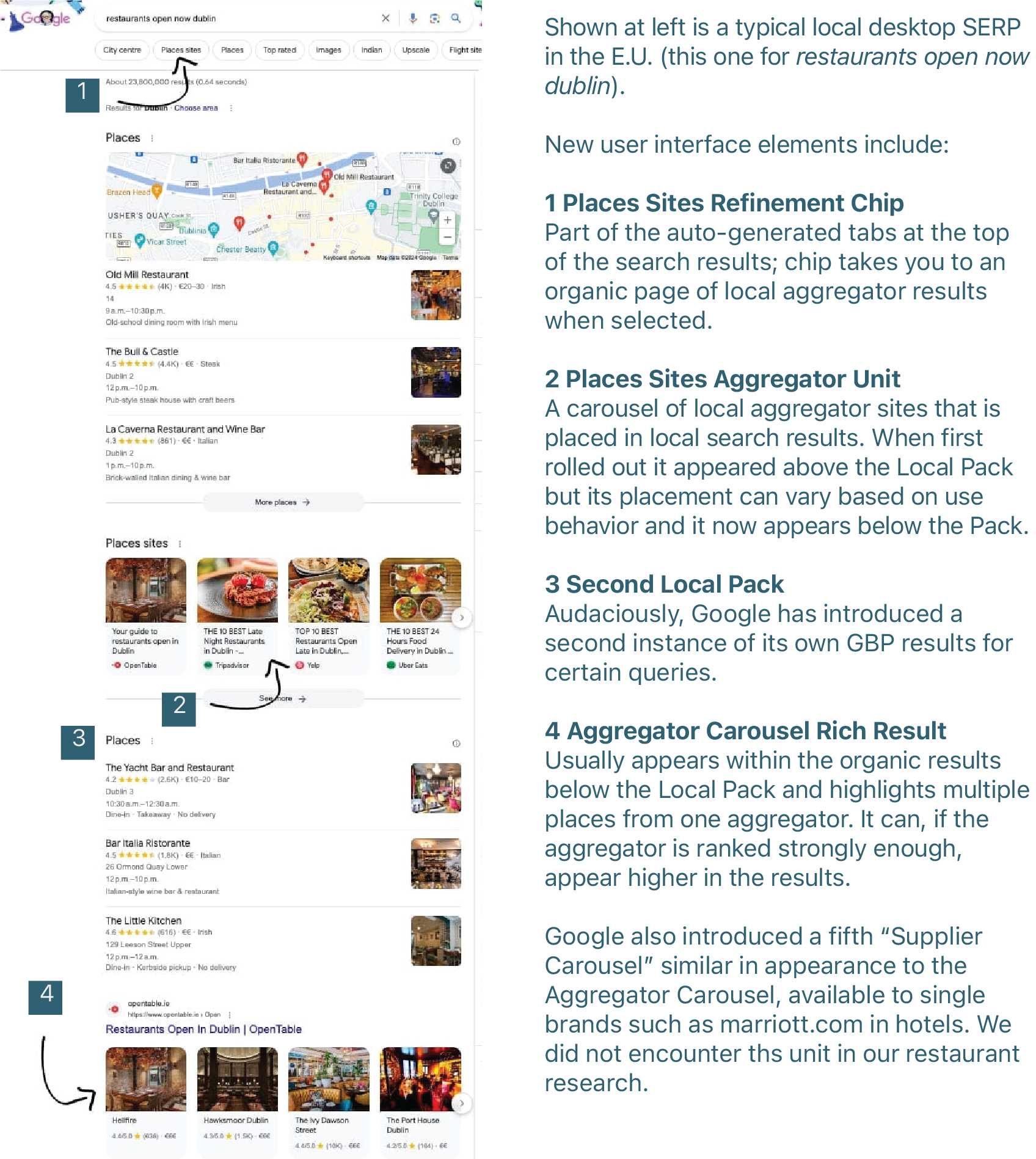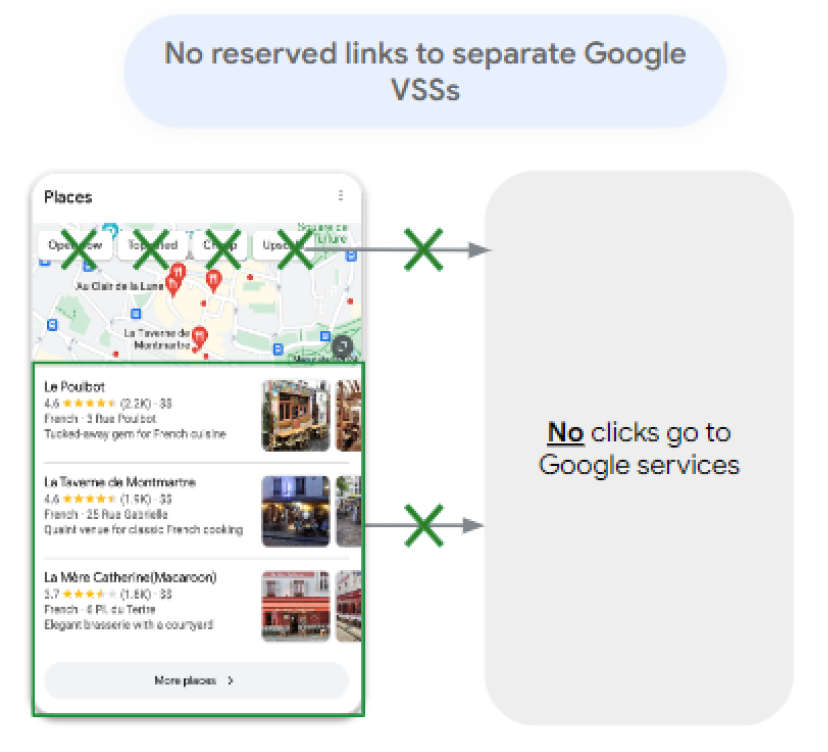Google Attempts to Redefine Its Local Services to Avoid DMA Compliance Consequences
Google has positioned entities of all sorts – whether local, hotel, tickets or products – as beyond the regulatory bounds of the DMA.

The Digital Markets Act
The Digital Markets Act, or DMA, is the European Union’s law "to make the markets in the digital sector fairer and more contestable." Six large platforms, including Google, have been designated as gatekeepers providing so-called Core Platform Services (such as online search engines), that are subject to this regulation.
The DMA addresses many more gatekeeper market positions beyond online search, including default browser and search engine choice, user data portability, and app stores. Near Media's narrow focus is around Google's compliance with DMA Article 6(5) for vertical (local and travel) searches:
The gatekeeper shall not treat more favourably, in ranking and related indexing and crawling, services and products offered by the gatekeeper itself than similar services or products of a third party. The gatekeeper shall apply transparent, fair and non-discriminatory conditions to such ranking.
Google's DMA Response Generates Skepticism
The European Commission hosted a workshop for Google to present its DMA compliance responses in Brussels on March 21. The Tech Oversight Project made our attendance at the workshop possible, and we were honored to speak with Commission members about our Irish consumer search research assessing Google's vertical search DMA response.
Earlier today, on the heels of last week's Google presentations, the European Commission opened an investigation into Google (Alphabet) around its self-preferencing in vertical search:
Alphabet's measures to prevent self-preferencing
The Commission has opened proceedings against Alphabet, to determine whether Alphabet's display of Google search results may lead to self-preferencing in relation to Google's vertical search services (e.g., Google Shopping; Google Flights; Google Hotels) over similar rival services.
The Commission is concerned that Alphabet's measures implemented to comply with the DMA may not ensure that third-party services featuring on Google's search results page are treated in a fair and non-discriminatory manner in comparison with Alphabet's own services, as required by Article 6(5) of the DMA.
Google's Proposed Local Solution
Google went to great lengths to emphasize the depth of its compliance commitment – 16 workshops and over 300 engineers involved in the effort – and yet few (if any) workshop attendees seemed happy with the effect of its solutions.
Below is an overview highlighting the major elements of Google's proposed DMA solution in Local (vertical) Search:

Vertical Search Services – "Aggregators," or directories in US search industry language (e.g., Tripadvisor, Yelp) – and websites are eligible for the new rich carousel results (markup details here).
Limitations of Google's Local, Hotel Search Definitions
Despite their intrinsic connection to Maps, Google seems to define Business Profiles as part of its core search service, arguing they should be excluded from regulatory consideration. Google has defined user interface elements, like the visually-prominent map insert in restaurant search results, as providing "context" to the search.
In the workshop, Google also positioned entities of all sorts – whether local, hotels, tickets or products – as beyond the regulatory bounds of the DMA.

If Google is allowed to exclude Maps, Local, and any consideration of entities as being outside the bounds of the self-preferencing regulation, the regulatory solutions offered so far will have little impact.
Google's Attempted Compliance Reframe
Google is attempting to reframe its compliance obligation in a couple of key ways:
- By positioning itself as stuck in the middle of competing Supplier and Aggregator factions, both of whom want more traffic, leaving Google unable to make significant changes because "feedback from different stakeholders was contradictory and diametrically opposed."
- By signaling that significant user interface changes would "degrade Google search in Europe," which Google asserts is not required by the DMA.
- By divorcing its own compliance responses from external success metrics.
(Quotes above from Oliver Bethell, Google EMEA Director of Competition.)
In shifting focus toward adding a few links and carousels here and there, Google is creating a dynamic where consumers, aggregator sites, and suppliers (hotels and airlines) are "fighting over the scraps." In this case, the scraps are which links should be included and where they should be placed.
Changing or adding a few links (as Google's solution tends to) simply divides and conquers the many businesses and consumers that are affected by Google search.
Data to Assess Compliance Lacking
At the March 21 workshop, groups representing both Suppliers and Aggregators complained that Google's introduced solutions had hurt both of their members' traffic. That leaves only one party whose traffic might have increased following the DMA solution: Google. This is hardly the "contestable" outcome that European regulators have been seeking.
During the workshop Q&A, we asked Google directly if it would share aggregate ranking and clickthrough data for Google Business Profile Local Packs and the newly-introduced carousel units.
Despite an explicit comment from Google Product Manager Chetna Bindra during Google's presentation that the new carousel units were "performing quite well," they did not provide data to back up this assertion.
While Google's Bethell did commit to sharing at least some of this data privately with E.U. regulators in his response, in a later comment he noted that “indicators of compliance will not involve particular outcomes – that is not the nature of this obligation."
It remains to be seen whether regulators will deem traffic delivered to non-Google properties as a Key Performance Indicator.
Future of Search and Competition
Search is essentially a ranking program that combines elements of all the websites links (the link graph) and all of the entities (the knowledge graph of people, places and things) into a user interface.
Historically its function has been to send searchers to the open web, but since the advent of the Local One Box in 2006, Google has seen its function more and more as providing direct answers to searchers queries using entities.
As has often been noted, including by Google itself over a decade ago, search is becoming ever more about "things not strings." The inclusion of generative AI into the interface further takes searchers and businesses down the path of answers, not traffic to the open web ("answers not links").
If Google continues to capture most user queries and uses entities and AI to directly answer their questions, it hardly seems that a fair and contestable digital market will have been achieved. In fact, just the opposite.
Whoever controls the entities controls general search, vertical search, and Maps.
Possible Vertical Search Remedies
Remedies settled on by the European Commission depend on their objectives and how they're measured. Structural solutions, like a break up of the many Google parts, could have unintended consequences – not the least of which is that the new entities could become their own monopolies.
Here are some potential solutions that we believe could be effective in accomplishing the DMA's objectives:
- Mandate a minimum percentage of vertical search traffic referred to the open web as a reasonable proxy for "fairness," regardless of where that traffic ends up. Percentage of traffic delivered to the open web is easily-trackable (surely Google is already tracking it) and ensures that search results are "contestable" by both aggregators and suppliers.
- Designate Google Maps as a search engine and apply a similar logic to it as other vertical search services.
- Evaluate whether (or where) user interface elements like the Local One Box (the "Local Pack") should be radically modified or removed entirely, as Local involves as much or more self-preferencing as any other search vertical.
- Require Google to make entity data across all verticals, including Local, available to other search engines at a reasonable cost, in the same manner it is required to share query, ranking, and click data with other search engines under DMA Article 6(11).
Our Framework to Assess Google's Compliance with the Digital Markets Act
The purpose of analyzing user behavior was to bring clarity to how users were interacting with the new Google results. How we view Google, the EU and suggested remedies is based on our lived experiences and business & personal philosophies. You can find our framework to assess Google's compliance in (html) and here in (pdf) so you can understand how our thinking has influenced our recommendations.
